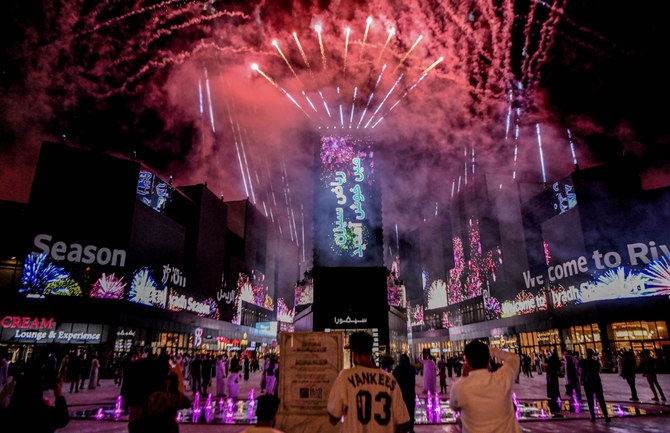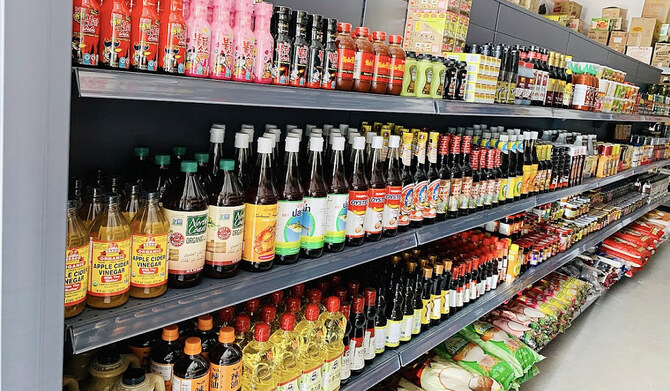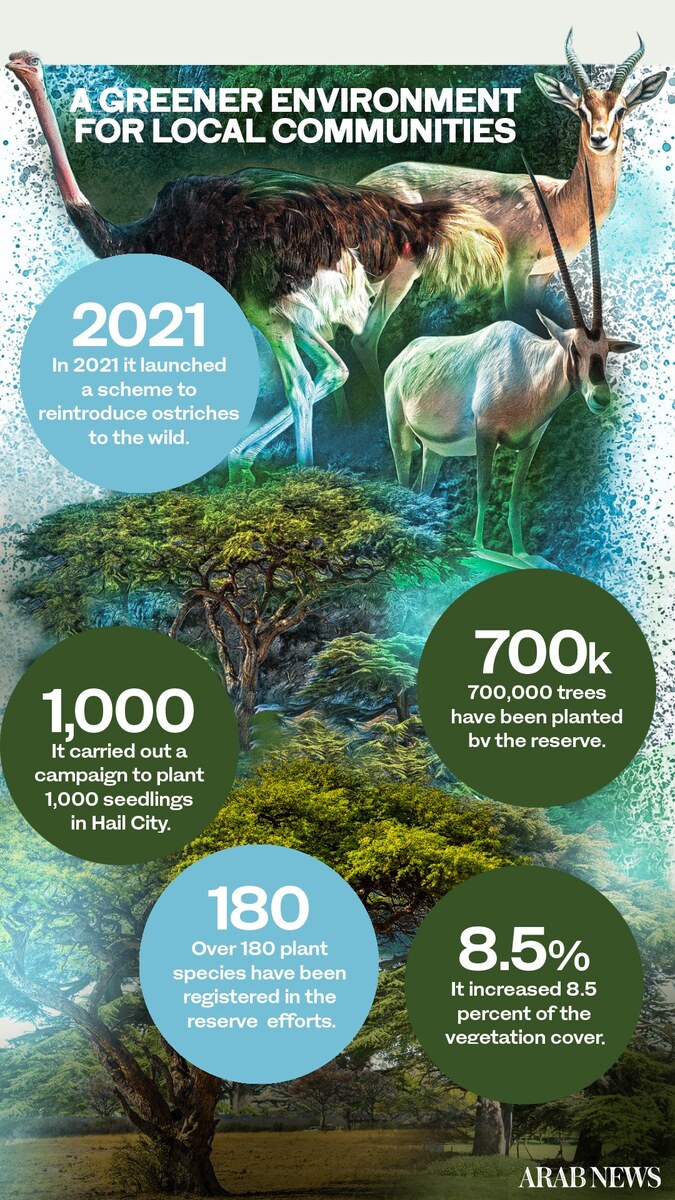ALULA/ ALKHOBAR/ DIRIYAH/ RIYADH/ JEDDAH: It’s time to ring in New Year 2023 with style! Cities across the Kingdom have prepared a wide variety of events for the occasion, with restaurants and hotels offering a plethora of dining options and live musical performances.
The Arab News team has highlighted a few places across the Kingdom where you can celebrate with friends and family like never before.
AlUla
The ancient city of AlUla has transformed from a historic remnant to the hottest new holiday destination in Saudi Arabia, and today, the city is buzzing with options for New Year’s celebrations.

Mamzel will be offering a luxurious New Year’s dinner in AlUla’s hidden canyons for a chance to experience Spanish culture. (Experience AlUla)
Winter at Tantoura, the Kingdom’s first annual winter music and culture festival, has returned for a fourth edition with a host of festive experiences.
Visitors can usher in New Year at the Kingdom’s first roller rink at the open-air “AlUla on Wheels,” with a dance experience curated by Swizz Beats alongside the region’s hottest performers, and explore the heart of AlJadidah, a lively cultural hub.
Another must-try for those new to the city is Habitas, a luxury resort that is one of the key hotspots of AlUla. Whether guests are staying in an eclectic caravan or in one of the villa options, they are met with a picturesque view of the mountainous terrain.
HIGHLIGHTS
• Those looking forward to celebrating New Year’s Eve in Riyadh will also have plenty of fine-dining options, music concerts and firework shows to savor.
• The ancient city of AlUla has transformed from a historic remnant to the hottest new holiday destination in Saudi Arabia, and today, the city is buzzing with options for New Year’s celebrations.
• From lavish dinners at fine restaurants, parties at beachfront hotels and rooftop soirees to stargazing in desert camps, Jeddah has it all to make New Year’s celebrations as memorable as possible.
The site offers endless leisurely activities, such as unique dining experiences, music performances and wellness activities. Art lovers can walk through the interactive Desert X artworks including artist Mohammed Ahmed Ibrahim’s vibrant “Falling Stones Garden” or Manal Al-Dowayan’s “Now You See Me, Now You Don’t” puddle installation.
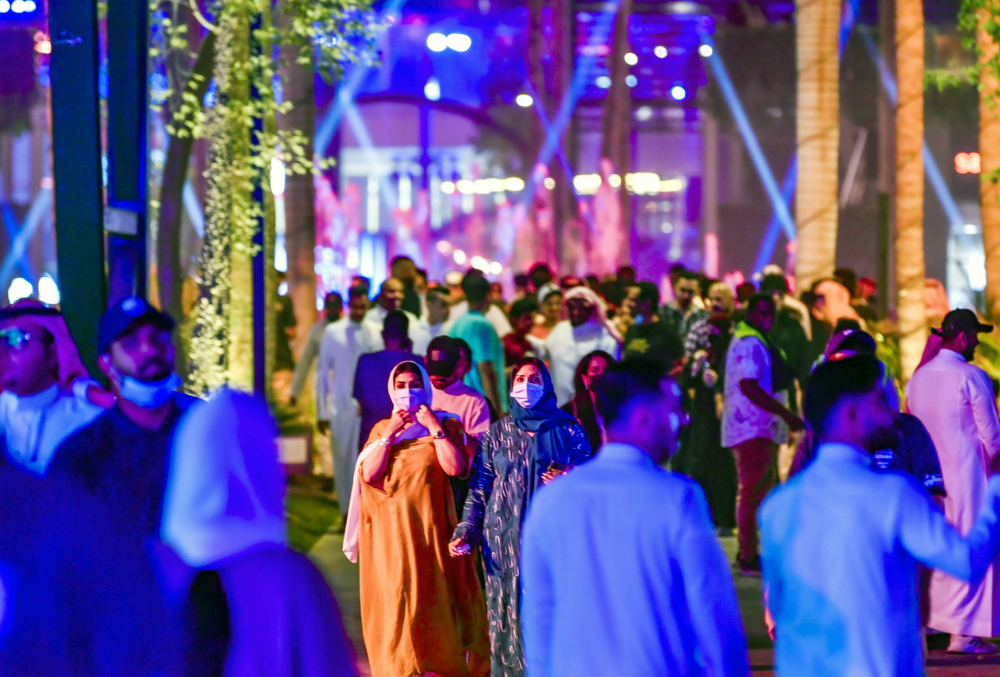
(AN photo by Basheer Saleh)
Visitors can also stargaze as the clock strikes midnight at the resort. Driven to the secluded Gharameel area, groups and individuals are encouraged to connect constellations under AlUla’s night sky, free of light and air pollution.
Mamzel will be offering a luxurious New Year’s dinner in AlUla’s hidden canyons for a chance to experience Spanish culture. Straight from Marbella, the restaurant will be holding live entertainment shows for diners as they feast on a set menu for SR600 ($160) per person for extended hours on Dec. 31.
Alfa’s Lounge, the city’s newest hangout spot, is another great option to prime your palette for New Year. The hidden establishment dazzles with its desert scenery and fairy light-like ambiance under the stars.

AlUla visitors can ring in the new year with a night of storytelling, historical lore of the Nabataean era, and carriage rides and shows at the Hegra after Dark experience. (Experience AlUla)
If an active lifestyle is on your 2023 resolutions list, AlUla’s adventure and outdoor experiences are the perfect opportunities to kickstart the journey to your fitness goals. Visitors can take an eight-hour Twisted Maze hike, trek through the Hidden Valley, cycle across the city’s sand dunes or get their hearts pumping with activities like ziplining, abseiling or rock climbing.
Winter at Tantoura’s celebrations don’t end with New Year. AlUla visitors will be tempted to walk the Incense Road in the area’s Old Town, lined with both heritage attractions and innovative activities, or indulge in a night of storytelling, historical lore of the Nabataean era, and carriage rides at Hegra after dark.
Shoppers are welcome to sample the exclusive items of the Ashar Valley Fashion event, featuring distinctive luxury pop-up stores from 4 p.m. to 11 p.m., with required ticket bookings in advance.
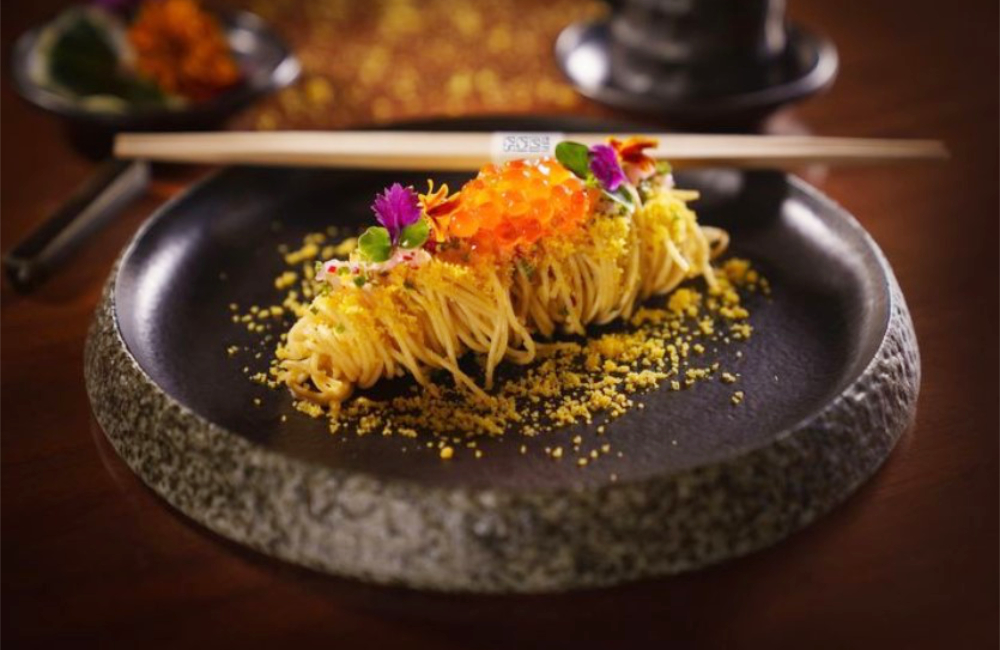
A dish from Sakana House. (Supplied)
The city’s first-ever food festival, Flavors of AlUla, brings international cuisines to locals, as well as myriad masterclasses by the food industry’s finest, palate-testing activities and food stalls. The festival, launched on Thursday, will conclude on Jan. 14.
Legendary Saudi musician Mohammed Abdo will hold a concert at the world’s largest mirrored architectural wonder, Maraya Music Hall. The opportunity to secure another fine dining booking at the venue’s restaurant, Maraya Social, is also available.
Alkhobar
When the clock strikes midnight on Dec. 31 in Sharqiya, what’s a better way to celebrate than to fill a cup with Saudi champagne and indulge in a great meal among loved ones? Sakana House at the Grand Hyatt Khobar promises to offer a fine time.
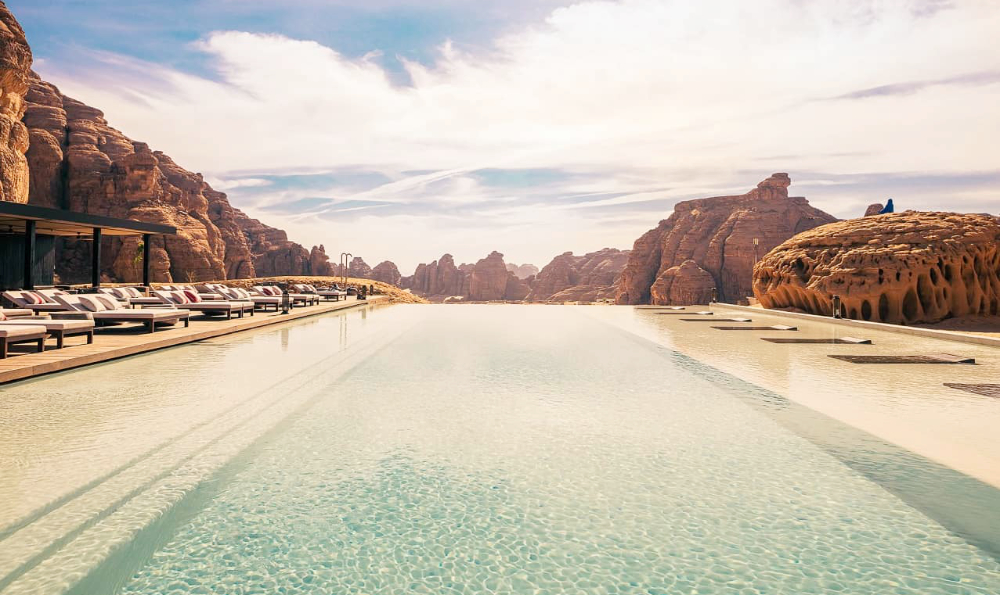
Staying and dining at Habitas is a must-try for those new to the city. Although on the pricier side, the resort is a sanctuary oasis and one of the key hotspots of AlUla’s revival. Whether guests are staying in an eclectic Caravan or in one of the villa options, they are met with a picturesque view of the mountainous terrain. (Experience AlUla)
With a fun countdown to midnight, a “fire show” and interactive sushi stations, visitors will have a fully immersive experience to work up an appetite.
The Sakana House Asian restaurant has been an elegant eatery since it opened its doors. While it has hosted a New Year’s Eve festivity before, this year, customers will enjoy a live DJ live musical performance by flutist Anastasia and DJ Vika.
Diners will start with a special selection of tantalizing dishes, including manchow soup, creamy and spicy shrimp salad, black pepper beef, crispy fish and egg-fried rice. For dessert, sphere en chocolat with raspberry jam and mango milk is on the list. Fresh seasonal fruit planners will be available all around, and hot and cold beverages are all-inclusive.

The open-air “AlUla on Wheels” offers a chance to explore the heart of AlJadidah, a lively cultural hub. Under the stars in a skate and dance experience curated by Swizz Beats, they can discover the music of the region’s hottest performers. (Experience AlUla)
John Paulo Francisco Mendoza, the restaurant manager, told Arab News: “This Dec. 31, Sakana House invites you to a new era of superior Asian cuisine.”
The experience can be enjoyed at SR320 per person, and operating hours are between 9:00 p.m. and 1:00 a.m.
Riyadh
Those looking forward to celebrating New Year’s Eve in Riyadh will also have plenty of fine-dining options, music concerts and firework shows to savor.
Mega concert “Trio Arabic Night” will take place on Dec. 31 in Boulevard Riyadh City at the Mohammed Abdo Arena.
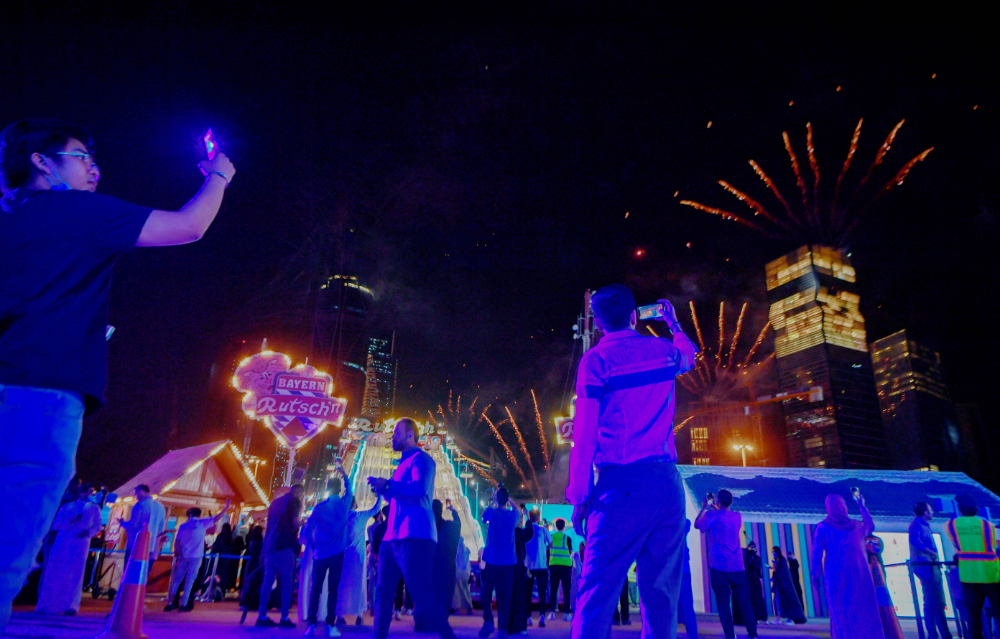
Billionaire Riyadh is hosting a night full of engaging entertainment and music performances. (AN photo by Basheer Saleh)
The concert features some of the biggest music artists from around the Arab world such as Nancy Ajram, Elissa, Asala Nasri, Najwa Karam, Angham, Latifa, Nawal Al-Zoghbi, Saber Rebai, Wael Kfoury, Assi El-Hallani, Bahaa Sultan and Waleed Tawfeek.
Here are some dining options to ring in New Year in the capital.
Billionaire Riyadh is hosting a night full of engaging entertainment and music performances with a taste of eclectic Asian-Italian cuisine.
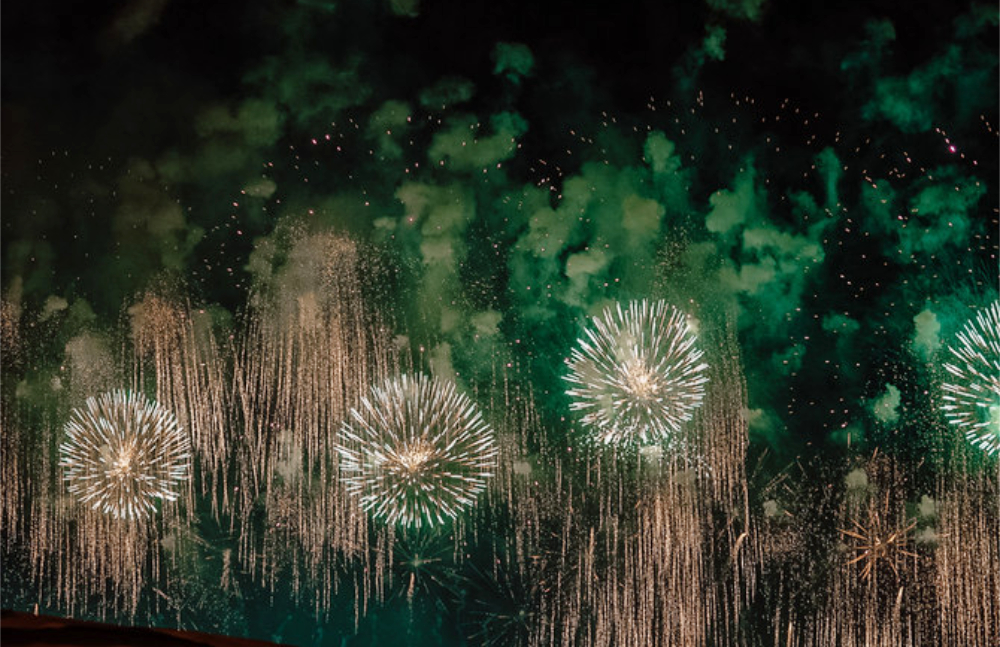
Fireworks will light up the sky as the countdown to New Year begins at Boulevard Riyadh City. (AN photo by Huda Bashatah)
Coya Riyadh is offering its guests an exclusive set menu that reflects the vibrant, bold choices of Latin American fare.
Critically acclaimed contemporary Japanese restaurant Sumosan is calling its New Year’s Eve celebration “Sakura Sky,” with a set menu and live DJ music.
Italian cuisine enthusiasts can hop over to Villa Signor Sassi or to Cipriani, which is serving classic Italian dishes during its “Grand Venetian Gala.”
Diriyah
Tucked away in the northwestern region of Riyadh is Diriyah, a UNESCO World Heritage Site that was also the first capital of the Saudi dynasty.
It was recently opened to the public after a little over a decade post-redevelopment. For New Year’s Eve, visitors can spend time walking around mudbrick buildings and a restored palace that once housed the Al-Saud dynasty to learn about the country’s history and its ruling family.
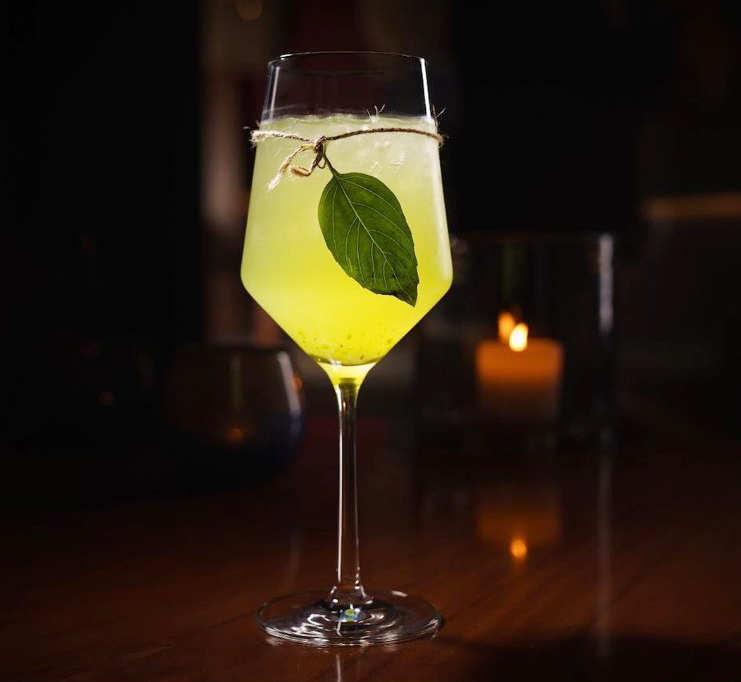
A refreshing drink from Sakana House. (Supplied)
They can also experience modern-day luxury in the form of high-end eateries, hotels, shopping outlets and state-of-the-art infrastructure.
The Bujairi Terrace — featuring over 20 restaurants, including international ones like Angelina Paris, Sarabeth’s and Villa Mamas, or local brands like SUGAR, GRIND and TAKYA — offers diners a wide variety to choose from.
Just 15 minutes away from Riyadh, Diriyah is easy to access for residents of the capital.
Jeddah
From lavish dinners at fine restaurants, parties at beachfront hotels and rooftop soirees to stargazing in desert camps, Jeddah has it all to make New Year’s celebrations as memorable as possible.
If you are looking for fancy food in a posh environment, Shang Palace restaurant offers a set menu option complete with sparkling beverages to enjoy alongside live music. The experience will start at 6 p.m. and will last till midnight.
Guests also have an a la carte option with a complimentary beverage upon arrival and will be presented with gifts as a gesture of good wishes for the coming year.
The Quarter restaurant at the Swissotel Living Jeddah also offers memorable dining in a chic atmosphere. Guests are treated to a live DJ performance and are spoiled for dining choices with a massive buffet.
The event starts at 7 p.m. and runs until 2 a.m., allowing guests ample time to enjoy everything the place has to offer.
A countdown will also be held at The Quarter restaurant and at the rooftop NEST lounge so that guests can enjoy the view of the city.
Obo Beach house restaurant at the Yacht Club has also organized special events to entertain guests with a perfect ambiance and sea view. The menu will offer an array of appetizing dishes and plenty of main courses including seafood, chicken and meat options.
Party in Asian style at Dabao restaurant, where you can enjoy an amazing Asian fusion dinner with a live DJ performance. To top it all off, deserts are on the house!
Noug Cafe and Jazz Bar, Noun and Kabana are also among the many restaurants in the city that are offering a variety of gastronomic experiences and live music all through the night.
Jeddah is home to some of the most beautiful properties and is offering seasonal discounts for anyone wishing to wake up to 2023 in the embrace of comfort and luxury.
Bay La Sun and VIEWS residences at the King Abdullah Economic City allow guests access to the private beach and an array of food options from the buffet at the Seasons Restaurant.
Similar options include Narcissus Resort and Spa in Obhur, Rosewood Jeddah, Assila and Swissotel Living Jeddah.


